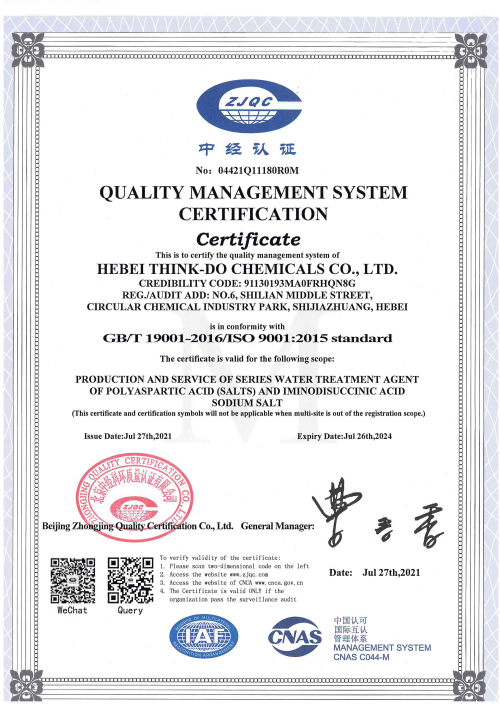
News
ספט . 23, 2024 00:17 Back to list
chelating agent water softening
The Role of Chelating Agents in Water Softening
Water softening is a crucial process aimed at reducing the hardness of water, which is primarily caused by the presence of calcium and magnesium ions. Hard water can lead to many issues, such as scaling in pipes and appliances, reduced effectiveness of soaps and detergents, and even skin irritation. Chelating agents have emerged as effective solutions in water softening, providing benefits that go beyond traditional methods.
Chelating agents are organic compounds that can form multiple bonds with a single metal ion, effectively grabbing it and preventing it from participating in undesirable reactions. When employed in water softening, these agents work by binding to calcium and magnesium ions, forming stable complexes that remain soluble and are easily removed from the water supply.
One of the most commonly used chelating agents in water softening is ethylenediaminetetraacetic acid (EDTA). EDTA can effectively bind with calcium and magnesium ions, significantly reducing water hardness. This property makes it advantageous in applications ranging from industrial water treatment to household cleaning products. The use of EDTA not only softens the water but also enhances the effectiveness of detergents by preventing scum formation during use.
chelating agent water softening

Another notable chelating agent is citric acid, which is often preferred for its biodegradable nature and lower toxicity compared to synthetic options
. Citric acid naturally occurs in citrus fruits and is effective at chelating metal ions, making it an eco-friendly alternative for water softening.In addition to improving water quality, the application of chelating agents in water softening systems can lead to cost savings. For instance, reducing scale formation in pipes and appliances minimizes maintenance costs and extends the lifespan of equipment. Furthermore, by providing softer water, these agents enhance the efficiency of soaps and detergents, thereby reducing the quantity needed for effective cleaning.
However, it is essential to balance the use of chelating agents with environmental considerations. While many chelating agents are effective, their breakdown products and potential environmental impacts require careful management. Ongoing research is focused on developing more sustainable alternatives and improving current formulations to ensure water softening remains both effective and environmentally friendly.
In conclusion, chelating agents represent an innovative approach to water softening, offering various benefits that enhance water quality and appliance longevity. As the demand for effective and eco-friendly water treatment methods continues to grow, the role of chelating agents will undoubtedly remain significant in the quest for improved water management practices.
-
Polyaspartic Acid Salts in Agricultural Fertilizers: A Sustainable Solution
NewsJul.21,2025
-
OEM Chelating Agent Preservative Supplier & Manufacturer High-Quality Customized Solutions
NewsJul.08,2025
-
OEM Potassium Chelating Agent Manufacturer - Custom Potassium Oxalate & Citrate Solutions
NewsJul.08,2025
-
OEM Pentasodium DTPA Chelating Agent Supplier & Manufacturer High Purity & Cost-Effective Solutions
NewsJul.08,2025
-
High-Efficiency Chelated Trace Elements Fertilizer Bulk Supplier & Manufacturer Quotes
NewsJul.07,2025
-
High Quality K Formation for a Chelating Agent – Reliable Manufacturer & Supplier
NewsJul.07,2025
